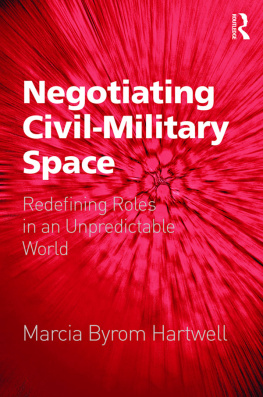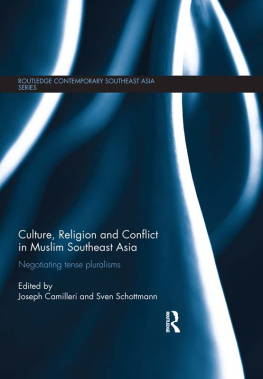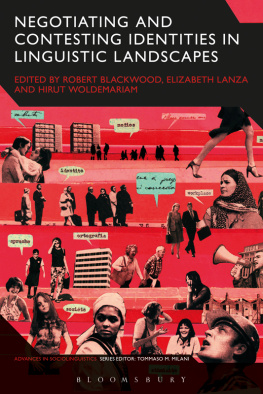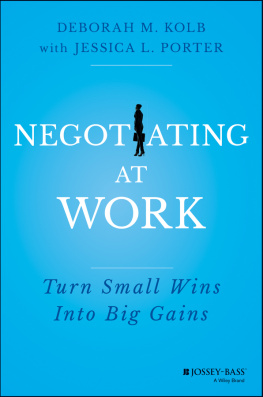Negotiating CivilMilitary Space
In conflict zones across the world, militaries and civilian organisations are expected to work together but often struggle to do so effectively. Drawing on a range of historical examples, Marcia Byrom Hartwells perceptive and empathetic analysis offers new ways of looking at this familiar problem. This is an important book that will be of use to scholars and practitioners alike.
Gordon Peake, Australian National University
Adept at navigating both the exclusive realms of international organizations and the U.S. Army, Dr Hartwells ability to bridge the significant cultural gaps between military and civilianand between academic and practitioneris key to the books insights. Many of the issues raised I witnessed first-hand in Iraq while serving with Dr Hartwell, as I was a primary facilitator of the transition of activities from the military to civilians. Addressing aspects of global security from military conflict to pandemics to crisis mapping to UAVs, her frank and balanced views and recommendations on civilianmilitary relations put this comprehensive book on the must read list for those interested in national security and humanitarian assistance, especially given the continued rise of nonstate actors and the necessity of whole of government approaches.
Jim Raimondo, The Fletcher School, Tufts University, USA
This book begins discussion at a point where many civilmilitary conversations end. Hartwell identifies underlying dynamics, key issues, and challenges that civilian and military organizations encounter when negotiating their roles in real and virtual volatile environments. These include managing expectations, understanding organizational missions and cultures, building trust, and exploring different approaches to violence. The impact of applied technologies on decision making processes and interventions is discussed in terms of recent and future complex crises. Linking earlier history to current discussions, this study makes an important contribution by reframing issues and outlining strategies to avoid unintended consequences and more effectively protect civilians in future operations. While geographic focus is on the Middle East, Africa, Central Asia, and Asia-Pacific, the core issues are applicable to negotiating civilmilitary relationships in a wide range of environments.
Marcia Byrom Hartwells current research builds upon experience as an embedded civilian advisor with the U.S. Army in Iraq (20092011) and work as a 2013 CSCMO Scholar (Center for the Study of Civil-Military Operations at USMA, West Point) and 2011 Public Policy Scholar, Woodrow Wilson International Center for Scholars, DC. Dr Hartwell received her DPhil (PhD) from the University of Oxford.
Negotiating CivilMilitary Space
Redefining roles in an unpredictable world
Marcia Byrom Hartwell
First published 2016
by Routledge
2 Park Square, Milton Park, Abingdon, Oxon OX14 4RN
and by Routledge
711 Third Avenue, New York, NY 10017
Routledge is an imprint of the Taylor & Francis Group, an informa business
2016 Marcia Byrom Hartwell
The right of Marcia Byrom Hartwell to be identified as author of this work has been asserted by her in accordance with sections 77 and 78 of the Copyright, Designs and Patents Act 1988.
All rights reserved. No part of this book may be reprinted or reproduced or utilized in any form or by any electronic, mechanical, or other means, now known or hereafter invented, including photocopying and recording, or in any information storage or retrieval system, without permission in writing from the publishers.
Trademark notice: Product or corporate names may be trademarks or registered trademarks, and are used only for identification and explanation without intent to infringe.
British Library Cataloguing in Publication Data
A catalog record for this book is available from the British Library
Library of Congress Cataloguing in Publication Data
Names: Hartwell, Marcia Byrom.
Title: Negotiating civil-military space : redefining roles in an unpredictable world / by Marcia Byrom Hartwell.
Description: Burlington, VT : Ashgate Publishing Company, [2016] | Includes bibliographical references and index.
Identifiers: LCCN 2015042277| ISBN 9781472440457 (hardback) |
Subjects: LCSH: Integrated operations (Military science) | Civil-military relations. | Postwar reconstructionGovernment policy. | Armed Forces Civic action. | United StatesArmed ForcesCivic action.
Classification: LCC U260 .H37 2016 | DDC 322/.50973dc23 LC record available at http://lccn.loc.gov/2015042277
ISBN: 9781472440457 (hbk)
ISBN: 9781315597645 (ebk)
Typeset in Times New Roman
by Out of House Publishing
Contents
PART I
Setting the stage
PART II
Reframing the issues
PART III
Looking ahead
I felt compelled to write this book from the viewpoint of someone who understands the questions that need to be asked rather than one who is able to supply all the answers. My goal has been to refocus civilmilitary conversations on issues that have prevented civilian organizations and military forces from identifying and developing more effective strategies to deal with multi-layered crises that are emerging from random combinations of violence and disasters. This book explores the early effects of social media platforms, communication technologies, and interaction of more recent technologies such as drones, robots, big data, and artificial intelligence on these issues, and why their technology enabled data are no substitute for human understanding and knowledge. The readers I primarily had in mind while writing this book belong to the international civilmilitary community. They are members of the US and international military forces and civilian humanitarian, aid, and development organizations who find themselves working alongside each other in dangerous areas. I also had in mind those who work offsite planning and overseeing policies that will be carried out by civilian organizations and military forces and the thousands of digital and other volunteers driven by a desire to help but who may have limited knowledge about how complex crises can evolve on the ground. Individuals with a professional or casual interest in international politics, international development and those struggling to understand US civilmilitary issues during the past decade may find these discussions useful.
The concept for this book grew out of an unanticipated encounter between myself and the US Army in Iraq from 20092011 who were probably as startled as I was to find myself embedded as a civilian advisor in their midst. Having researched and conducted fieldwork interviews on international conflicts and development in the UK for a MSc, then DPhil (PhD), I understood the intricacies of geopolitics and violence but knew little about US military culture. My previous interactions had been mostly with international forces in the UK whose members casually mingled with civilians in academic and everyday life. I was interested in the role of security forces during conflicts and as peacekeepers but they rarely allowed me to formally interview them especially in Northern Ireland, Serbia, and South Africa where I asked former combatants and community members for their opinions on forgiveness, revenge, and reconciliation. It was during this time I came to appreciate the ambiguity of supposedly clear cut motivations for conflicts and the vicious cycle between victims and perpetrators. I began to understand how easily people could be motivated to fight and how much more difficult it was to persuade them to stop. As an American living in the UK for nearly 10 years I had been the recipient of unfiltered news and comments that resulted in developing good debating skills and a somewhat Euro-American cross-cultural civilmilitary view. The basis for many discussions in the following chapters is drawn from this early research and experiences which strangely prepared me for working inside US military culture.









